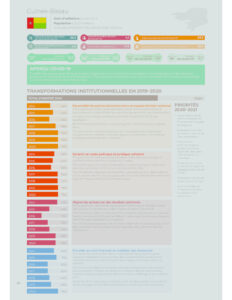Situation nutritionnelle
Retard de croissance des enfants de moins de cinq ans (%)
27.6
Surpoids des enfants de moins de cinq ans (%)
2.3
Anémie des femmes entre 15-49 ans (%)
43.8
Émaciation des enfants de moins de cinq ans (%)
6
Faible poids à la naissance (%)
21.1
Allaitement exclusif des nourrissons de 0-5 mois (%)
52.5
Surpoids des adolescents (%)
Hommes: 6.6
/ Femmes: 14
Surpoids des adultes (%)
Hommes: 22.2
/ Femmes: 37.2
Obésité des adultes (%)
Hommes: 5
/ Femmes: 13.7
Diabète des adultes (%)
Hommes: 7.4
/ Femmes: 6.8
Aperçu COVID-19
Guinea Bissau experienced a turbulent 2020, with parliamentary and presidential elections, a change of government and the outbreak of the pandemic. A state of emergency was declared, with restrictions on movement and gatherings. The National Committee on Nutrition was reestablished through virtual meetings.
Transformations institutionnelles en 2019-2020
Rassembler les parties prenantes dans un espace d’action commun
The National Committee on Nutrition is involved in monitoring the implementation of the National Nutrition Policy and the respective Strategic Plan 2016–2020, through actions carried out by its constituent parts. Efforts have been made to increase actors in the field of food and nutrition security. Monitoring mechanisms are under way in the area of food and nutrition security. Periodic reports are produced on this topic, including Multiple Indicator Cluster Surveys, SMART surveys, and food and nutrition system and monitoring.Garantir un cadre politique et juridique cohérent
Implementation and monitoring of the National Multisectoral Strategic Plan for Nutrition 2015–2020 is being carried out. There is a package of essential legislation, with some laws already regulated, with effective application. Although there has been progress and there are promising results, greater efforts are required in order to ensure greater regularity and operability of coordination mechanisms for implementation.Aligner les actions sur des résultats communs
The Common Results Framework is the Strategic Plan for Nutrition. It was developed on the basis of the National Nutrition Policy, which serves as the reference. Data on food and nutrition security are integrated into the country’s main consolidated reports, specifically Multiple Indicator Cluster Surveys and the Nutrition Monitoring System (SISSAN). Joint planning, monitoring and evaluation sessions are held periodically, at the national, regional and sectoral levels, to share information and experiences. Joint mechanisms for the coordination of interventions, monitoring and evaluation have been set up. Strengthening and greater investment for technical capacity is needed.Procéder au suivi financier et mobiliser des ressources
Most of the resources for funding actions on nutrition are provided by development partners, which have recently been joined by the European Union and the World Bank. The Government has shown willingness to mobilise more resources for nutrition. Strategies for financial stability are being developed for some programmes. For example, the WFP buys food from rural women which is distributed in schools, ensuring local development and the empowerment of women.Priorités 2020-2021
- Broadening the representation of civil society and the private sector in the National Multi- Sectoral Nutritional Committee.
- Strengthening coordination at the central, regional and local level.
- Reviewing and accelerating the implementation of the National Multi- Sectoral Strategic Plan for Nutrition 2015–2020 for the remaining objectives.
- Integrating nutrition in the state budget and establishing a monitoring system for the implementation of intersectoral budgetary implementation.
- Developing and adopting a National Food and Nutrition Security Policy to address the structural and direct causes of malnutrition.
- Strengthening communication, education and advocacy on nutrition.
Télécharger

